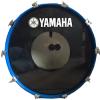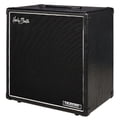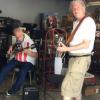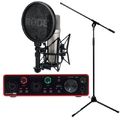Reading Wavs

Membre
Posts: 522
Joined: 27 févr. 2015
Anyone else record their loops by just looking at the dynamics of the wavs in their DAW? Or am I going mad?

Membre
Posts: 34
Joined: 22 sept. 2013
To my shame occasionally I do, but only for synchronization. I have not yet reached the level do I navigate only with sound.

Harley Benton G112 Celestion V30
Cabinet for Electric Guitar

169 €
iThis widget links to Thomann, our affiliate partner. We may receive a commission when you purchase a product there.
Visit Shop

Membre
Posts: 213
Joined: 7 mars 2014
I will for timing only. I'm a stickler for time, though. If I can I will find a tempo and add a click intro. It's important, IMO, for people who want to just play along with the web player.
I've been known to ... ahem ... adjust poor timing within Logic.
I've been known to ... ahem ... adjust poor timing within Logic.

Membre
Posts: 522
Joined: 27 févr. 2015
Me too Danny! I just find I can often look at the wavs and it's pretty often obvious where the changes are or where there are stops! I find I use it to guide me when I'm jamming the tracks if I've not bothered putting in markers which I do for more complex arrangements.

SUPPORTER
Posts: 160
Joined: 9 juin 2014
That's something I do too! Looking at the screen and it will show were a turn is gonna be! Works fine! :)
SUPPORTER
Posts: 2953
Joined: 30 déc. 2010
...erm... I sometimes do cut n paste sound editing jobs just by looking at the wavs and the grid in cubase - thats what they are there for, its not like waveforms were just fancy visualisations without any use :) So, no, you're certainly not going mad IMO :)

Membre
Posts: 990
Joined: 16 oct. 2011
I haven't done this yet may have to try this and see how it goes. I take the chords and play by ear and play the track over and over until I am happy with it. Sometimes the changes are not exact.

Membre
Posts: 20
Joined: 15 avr. 2015
I've done this most of the time when jamming with 2 to 4 musicians!

Harley Benton G112 Celestion V30
Cabinet for Electric Guitar

169 €
iThis widget links to Thomann, our affiliate partner. We may receive a commission when you purchase a product there.
Visit Shop

SUPPORTER
Posts: 541
Joined: 25 nov. 2013
I guess I'm mad with you brother. I stare at the dam thing continually and need to remind myself to blink. Playing live with people (like Gerhard) who expect you to follow/play along with whatever they do has meant that I watch their hands for clues. Watching the wavs is an extension of doing the same thing for me. Most of the time I open a file and just hit record without knowing what's about to play. About a one out of five times I get away with it on the first recording. The rest of the time I need two or more takes. Saves time and keeps me exercised in what I really like doing...live jamming where I have no clues other than what's heard and watching string and keyboard player's hands.
Now a question back: What's people's ratio of recording time to edit time? For me it's probably up to ten times as much time editing as it takes to record (regardless of how many takes). I can easily record around 5 tunes an hour (including set-up, instrument and setting changes). I'm lucky if I can edit one tune in two hours. Is this normal?
Now a question back: What's people's ratio of recording time to edit time? For me it's probably up to ten times as much time editing as it takes to record (regardless of how many takes). I can easily record around 5 tunes an hour (including set-up, instrument and setting changes). I'm lucky if I can edit one tune in two hours. Is this normal?

Membre
Posts: 522
Joined: 27 févr. 2015
For me, I usually get a single recording done in under 20 minutes (1-3 takes and, with a few exceptions, I largely go at it 'blind' ), depending on how many run-throughs I do first to make sure I've got the cue points. If it's not together within that sort of time, I leave it and come back to it another time.
Mixing time is anything from 30mins to an hour and-a-half depending on how many drum edits I need to do (I have to edit 7 tracks simultaneously - kick, snare, three toms and two overheads - when adjusting my drums so all the mics are in sync). The actual mixing doesn't take massively long, unless I've got a lot of other stems to include as I've got pretty much everything for my drum sound set up as a template so I don't have to do much work mapping sends or setting up plugins. I don't tend to fiddle with the tracks from the Wikiloops template (or HD stems) as I don't like to mess with other people's recorded sound - I try and mix to it, rather than bend their sound to suit me.
I could spend a lot longer, but a lot of the grunt work has already been done and saved into my recording templates in Reaper. That leaves me just the editing and fine tuning to do at mixdown. Without the templates preset with all my mappings, plugins, etc., set up every loop would probably take 3 hours or more to do!
[url=https://cudadrive.com/thumbs_public/48x6S7TacoR6ieL2/Screen%20Shot%202015-12-19%20at%2017.18.07.png?size=2048]This is what a mixdown[/url], post drum recording, looks like for me. Everything there (apart from the wavs themselves) is pre-mapped from a template project.
Mixing time is anything from 30mins to an hour and-a-half depending on how many drum edits I need to do (I have to edit 7 tracks simultaneously - kick, snare, three toms and two overheads - when adjusting my drums so all the mics are in sync). The actual mixing doesn't take massively long, unless I've got a lot of other stems to include as I've got pretty much everything for my drum sound set up as a template so I don't have to do much work mapping sends or setting up plugins. I don't tend to fiddle with the tracks from the Wikiloops template (or HD stems) as I don't like to mess with other people's recorded sound - I try and mix to it, rather than bend their sound to suit me.
I could spend a lot longer, but a lot of the grunt work has already been done and saved into my recording templates in Reaper. That leaves me just the editing and fine tuning to do at mixdown. Without the templates preset with all my mappings, plugins, etc., set up every loop would probably take 3 hours or more to do!
[url=https://cudadrive.com/thumbs_public/48x6S7TacoR6ieL2/Screen%20Shot%202015-12-19%20at%2017.18.07.png?size=2048]This is what a mixdown[/url], post drum recording, looks like for me. Everything there (apart from the wavs themselves) is pre-mapped from a template project.

SUPPORTER
Posts: 541
Joined: 25 nov. 2013
That's a lot of channels to worry about, yet I guess that once set, the level you're recording at is going to be right for the whole track? Much respect for your professionalism in setting all those microphones up and getting the sound so good. Even more respect for playing at a professional level that makes it worthwhile. So good to hear a fine muso with good gear. Very sad when you come across a real talent with crap gear...and then there's way to many without talent that have the best gear and no clues...life.
My biggest problem is dynamics. I don't do myself many favors in the style I play going from ppp to fff so need to adjust all the way through so that there's still dynamics, yet it's working correctly within the mix.
As much as I like to think of myself as an OK rhythm player I do lots of adjustments as I'm mostly playing off the rhythm in a lyrical style where (for me) micro seconds make the difference in what a line feels like. It's also that combination with dynamics where the entry point may be too low to be distinctly heard. My style of playing just doesn't work well for recording, so it makes for a lot of edit work. Maybe I should do templates and make everybody else work to my levels. Ha! Well that would probably be like a hedgehog crossing the road at a marked crossing and thinking everybody will stop.
My biggest problem is dynamics. I don't do myself many favors in the style I play going from ppp to fff so need to adjust all the way through so that there's still dynamics, yet it's working correctly within the mix.
As much as I like to think of myself as an OK rhythm player I do lots of adjustments as I'm mostly playing off the rhythm in a lyrical style where (for me) micro seconds make the difference in what a line feels like. It's also that combination with dynamics where the entry point may be too low to be distinctly heard. My style of playing just doesn't work well for recording, so it makes for a lot of edit work. Maybe I should do templates and make everybody else work to my levels. Ha! Well that would probably be like a hedgehog crossing the road at a marked crossing and thinking everybody will stop.

Membre
Posts: 522
Joined: 27 févr. 2015
Too true, Wade, too true. Wise words...
To answer your dynamics question, compressors are your friend. Read up on them, look up which ones are available for the software you use to record. Compressors are massively abused right across the industry but, when used with a good musical ear, they are your saviour from a lot of work. What you need is the 'quiet' to still be heard above the backing track but it being obvious that you're playing gently. Unlike Scooby Doo, 'it's all done with compressors' - not mirrors!
Brass (and most wind instruments), like vocals and percussion, have a vast dynamic range as well as potentially harsh transients and attacks. Microphones and, in particular, the digital world do not like this. Unlike the analogue world of old, do not cross the 0db threshold in the digital world - it's ugly and the gentle distortion of analogue doesn't exist. All things digital are binary - it distorts or it doesn't. The plus side is that you can record well under this without the risk of good old hiss, etc.. I record all my drums with about 5-7db headroom - quiet by commercial standards who run everything hot. But the lack of hiss means I can boost them without fear of adding noise. Anyway, back to compressors...
Harsh transients are hard to 'smooth' out from a recording perspective without practice and knowledge. From the softest of the soft to the loudest of the loud, you rightly need to get the expression in your track - your playing is expertly expressive, incidentally - without robbing it of the dynamics and therefore soul. As always, the answer is not easy. But help is available in the form of compressors...
As a starting point, record with a compressor active - not a harsh setting, just one to take the loudest down a bit and the softest up a bit. This then evens out the recorded signal before you've even started a mix. Keep it gentle though, you only want to pull back the extreme volumes. The idea is to just smooth out the extremes of volume here and, most importantly, stop you going over that 0db recording signal and introducing that hideously ugly digital distortion.
Most compressor plugins have an 'Auto Make-Up Gain' function - this is useful for what you want but I'd personally recommend only enabling this setting at mixdown, not recording. At mixdown, this function enables the compressor to focus on squashing the loudest bits down a bit and let the gentler lines get lifted a tad.
As a starting point, I'd be inclined to use a compressor setting not too dissimilar to what I use on my kick and snare drum where the attacks can be loud and short. I have the compressor set to about an 18ms attack (any lower and it starts to mute the initial attack of the sound) with a 6-8db reduction. This lets the initial attack through but very quickly pulls back the overall volume on the loudest noises.
There are many people on here far more expert in this than me, so I'm only imparting what little knowledge I have on the matter.
There are pages and pages and pages out there on using compressors. Have a look around. The DAW software you use should have a compressor plugin available as standard. And if I've just spent that last couple of hundred words telling you how to suck eggs, I apologise. I'm hoping to save the hassle of moving faders about during a mixdown!
I will finish by saying that, although it sounds like a lot of work your end, your mixes are always magnificently expressive and 'human-sounding'. Compressors, used well, will make this workload a lot less for you without compromising your phenomenal musicality and feel.
And, by the sound of it, quarter the amount of time it'll take you to do a mix.
To answer your dynamics question, compressors are your friend. Read up on them, look up which ones are available for the software you use to record. Compressors are massively abused right across the industry but, when used with a good musical ear, they are your saviour from a lot of work. What you need is the 'quiet' to still be heard above the backing track but it being obvious that you're playing gently. Unlike Scooby Doo, 'it's all done with compressors' - not mirrors!
Brass (and most wind instruments), like vocals and percussion, have a vast dynamic range as well as potentially harsh transients and attacks. Microphones and, in particular, the digital world do not like this. Unlike the analogue world of old, do not cross the 0db threshold in the digital world - it's ugly and the gentle distortion of analogue doesn't exist. All things digital are binary - it distorts or it doesn't. The plus side is that you can record well under this without the risk of good old hiss, etc.. I record all my drums with about 5-7db headroom - quiet by commercial standards who run everything hot. But the lack of hiss means I can boost them without fear of adding noise. Anyway, back to compressors...
Harsh transients are hard to 'smooth' out from a recording perspective without practice and knowledge. From the softest of the soft to the loudest of the loud, you rightly need to get the expression in your track - your playing is expertly expressive, incidentally - without robbing it of the dynamics and therefore soul. As always, the answer is not easy. But help is available in the form of compressors...
As a starting point, record with a compressor active - not a harsh setting, just one to take the loudest down a bit and the softest up a bit. This then evens out the recorded signal before you've even started a mix. Keep it gentle though, you only want to pull back the extreme volumes. The idea is to just smooth out the extremes of volume here and, most importantly, stop you going over that 0db recording signal and introducing that hideously ugly digital distortion.
Most compressor plugins have an 'Auto Make-Up Gain' function - this is useful for what you want but I'd personally recommend only enabling this setting at mixdown, not recording. At mixdown, this function enables the compressor to focus on squashing the loudest bits down a bit and let the gentler lines get lifted a tad.
As a starting point, I'd be inclined to use a compressor setting not too dissimilar to what I use on my kick and snare drum where the attacks can be loud and short. I have the compressor set to about an 18ms attack (any lower and it starts to mute the initial attack of the sound) with a 6-8db reduction. This lets the initial attack through but very quickly pulls back the overall volume on the loudest noises.
There are many people on here far more expert in this than me, so I'm only imparting what little knowledge I have on the matter.
There are pages and pages and pages out there on using compressors. Have a look around. The DAW software you use should have a compressor plugin available as standard. And if I've just spent that last couple of hundred words telling you how to suck eggs, I apologise. I'm hoping to save the hassle of moving faders about during a mixdown!
I will finish by saying that, although it sounds like a lot of work your end, your mixes are always magnificently expressive and 'human-sounding'. Compressors, used well, will make this workload a lot less for you without compromising your phenomenal musicality and feel.
And, by the sound of it, quarter the amount of time it'll take you to do a mix.

Focusrite Scarlett 2i2 3rd NT1A Bundle
Rode NT1-A Complete Vocal Recording

299 €
iThis widget links to Thomann, our affiliate partner. We may receive a commission when you purchase a product there.
Visit Shop

SUPPORTER
Posts: 541
Joined: 25 nov. 2013
Such eggs...moi? No chance...I'm barely able to do any of this technological stuff. My recording and editing is done in Audacity...and it's still too complex for me. I can only use the compressor in there when editing, not recording. Sounds like an excellent idea though. Would need a full tutorial on what gear to get, how to do a "plug in", settings, etc. The editing compressor I've played with a little, but it seems to mostly be about bringing everything up without distortion rather than bringing things up just partially. Never any problems with hiss...lucky there (the presets are OK?) although I record at relatively low level and then just bring everything up. Also need to adjust the volume after using Audacity's "Gverb",which is a type of reverb. The Gverb is the one thing I'd never wish to loose as it's totally adjustable for every parameter. Other programs I've tried to use all have these long lists of preset reverbs....totally useless as the last thing I want to do is go through 200 presets to find the right reverb for the track. Takes me 10 seconds in Audacity to set the reverb to what I want. Mind you the latest versions have changed this somewhat so I only use the older version.
Yes, I'm old and it shows...need a kid to show me what to do with this technology...can't even text! Useless old fart! I feel fortunate to have someone like you bother to write these suggestions. Much appreciated. Now where do I find that smart kid who can give me some hands on training?
Cheers---W
Yes, I'm old and it shows...need a kid to show me what to do with this technology...can't even text! Useless old fart! I feel fortunate to have someone like you bother to write these suggestions. Much appreciated. Now where do I find that smart kid who can give me some hands on training?
Cheers---W

Membre
Posts: 522
Joined: 27 févr. 2015
Ahh, OK. You're using Audacity. Give me a bit of time and I'll come up with some stuff for you. I'll PM when I've worked it out. I use Audacity to edit audio files but not to record. I use Reaper (which is free to use and well worth the time investment) which is a full DAW. Audacity, luckily, does support VST plugins, etc., so we should be able to come up with something without you having to learn a whole new tranche of software! :)

SUPPORTER
Posts: 541
Joined: 25 nov. 2013
Very Very kind of you. Have never used reaper (as in Grim?). Have tried a few others. I'm sure that once you get used to them they are OK...but found the reverb presets a disaster in most. I'm very much in favor with anything that could cut down the edit time. Would much rather be playing than editing as I'm really an outdoor sort of person. May not matter as much in winter but it's now summer here and light until 9PM. I get up around 6:30 and stop working around 8PM. Not long after dinner it's time for bed so little time is available for those long editing sessions. Mostly gets done on rainy days. Sympathy unnecessary, I love my work and take breaks when I want, but just not usually long enough to start an editing session.
any clues would be greatly appreciated.
Cheers---W
any clues would be greatly appreciated.
Cheers---W
wikiloops online jamsessions are brought to you with friendly
support by:

My guitar sat in a corner. Then I discovered wikiloops and now, not one day has gone by that I haven't played it.
Psycho